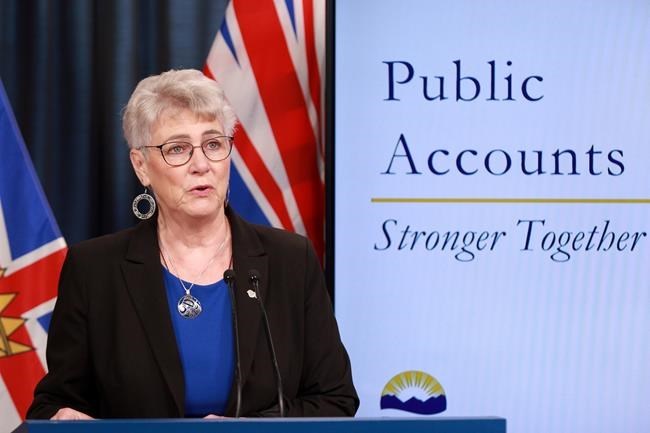VICTORIA — British Columbia finished last fiscal year $700 million in the black, after forecasts swung between multi-billion-dollar deficits and surpluses.
Finance Minister Katrine Conroy said despite global uncertainty and inflation the province's bottom line showed a surplus due to economic and job growth and increased revenue from income taxes and natural resources.
She acknowledged the government's forecasts for 2022-2023 had been on an up-and-down ride for the past two years. A $5.5-billion deficit was predicted in February last year, before that was revised to a surplus of almost $6 billion, then downgraded to a $3.6-billion surplus.
The final audited public accounts for the fiscal year that ended March 31, 2023, released Wednesday, show a surplus of $704 million.
Conroy had forecast three years of consecutive deficits last March, with the current 2023-2024 budget projected to bring a deficit of $4.2 billion.
The minister said the government's most recent financial data will be released next month during a quarterly update.
"At that time, I'll be talking to you about some of the challenges B.C. continues to face, including our record wildfire season, global inflation, higher interest rates and slower global economic growth," Conroy said. "We know the challenges are not over. There are more to come. The brutal wildfire season is a reminder of that."
She said the audited public accounts show B.C.'s economy grew by 3.6 per cent, tied for fourth highest among the provinces and equal to Canada's national growth.
The province's debt had been reduced from $90.6 billion to $89.4 billion and operating debt had been "eliminated," said Conroy.
She said provincial revenue was almost $13 billion, with the government spending $7.8 billion on targeted investments to reduce costs for people and strengthen long-term services.
"What's the alternative, to make cuts and not support people?" Conroy said. "We're just not going to do that."
Additional spending included $1.5 billion in cost-of-living supports, $1.23 billion in housing initiatives and $1.5 billion on contract settlements for public service employees, she said.
Conroy said the public accounts represent a "high-level view" of how B.C. ended the year.
The government also spent $6.8 billion on infrastructure projects, including roads, bridges, hospitals and schools, said Conroy, adding supply chain issues and labour shortages continue to affect some projects.
"We know it's people who build our province," said Conroy, adding government investments in infrastructure, as well as health and climate initiatives, make the economy "stronger and more resilient."
This report by The Canadian Press was first published Aug. 30, 2023.
Dirk Meissner, The Canadian Press



